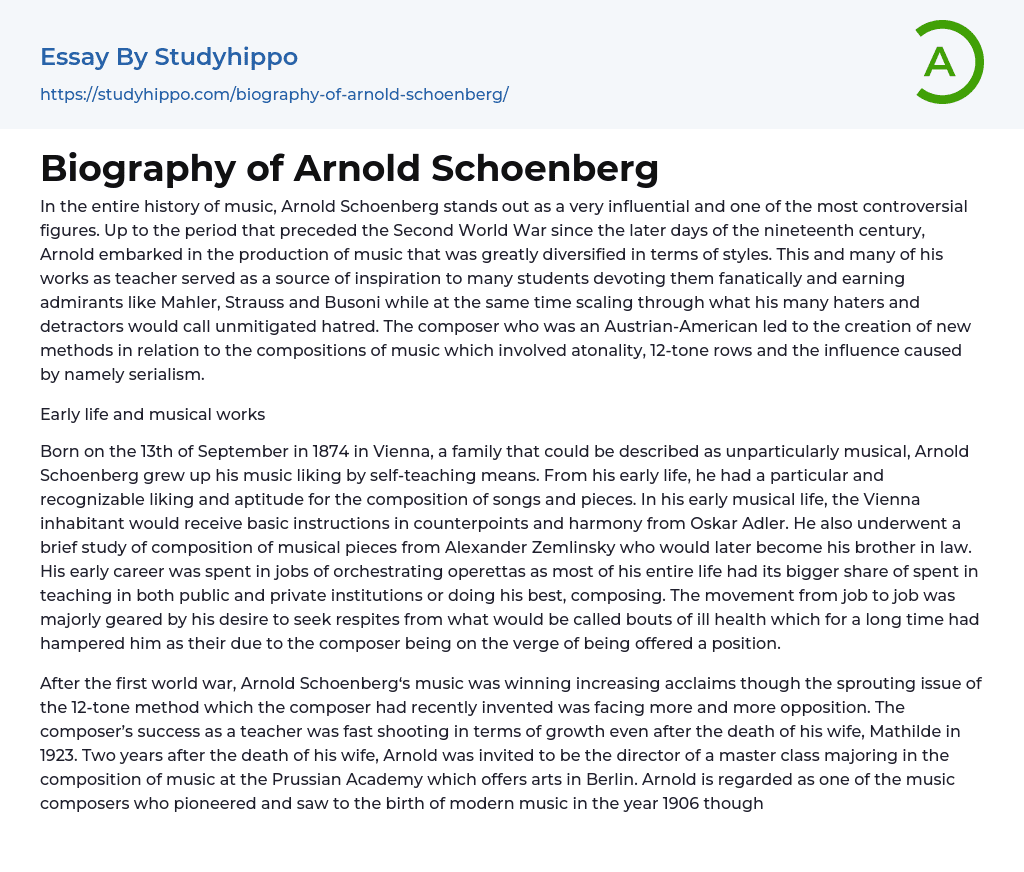In the entire history of music, Arnold Schoenberg stands out as a very influential and one of the most controversial figures. Up to the period that preceded the Second World War since the later days of the nineteenth century, Arnold embarked in the production of music that was greatly diversified in terms of styles. This and many of his works as teacher served as a source of inspiration to many students devoting them fanatically and earning admirants like Mahler, Strauss and Busoni while at the same time scaling through what his many haters and detractors would call unmitigated hatred. The composer who was an Austrian-American led to the creation of new methods in relation to the compositions of music which involved atonality, 12-tone rows and the influence caused by namely serialism.
Early life and musical works
Bo
...rn on the 13th of September in 1874 in Vienna, a family that could be described as unparticularly musical, Arnold Schoenberg grew up his music liking by self-teaching means. From his early life, he had a particular and recognizable liking and aptitude for the composition of songs and pieces. In his early musical life, the Vienna inhabitant would receive basic instructions in counterpoints and harmony from Oskar Adler. He also underwent a brief study of composition of musical pieces from Alexander Zemlinsky who would later become his brother in law. His early career was spent in jobs of orchestrating operettas as most of his entire life had its bigger share of spent in teaching in both public and private institutions or doing his best, composing. The movement from job to job was majorly geared by his desire to seek respites fro
what would be called bouts of ill health which for a long time had hampered him as their due to the composer being on the verge of being offered a position.
After the first world war, Arnold Schoenberg‘s music was winning increasing acclaims though the sprouting issue of the 12-tone method which the composer had recently invented was facing more and more opposition. The composer’s success as a teacher was fast shooting in terms of growth even after the death of his wife, Mathilde in 1923. Two years after the death of his wife, Arnold was invited to be the director of a master class majoring in the composition of music at the Prussian Academy which offers arts in Berlin. Arnold is regarded as one of the music composers who pioneered and saw to the birth of modern music in the year 1906 though his first performance, the scandal concert in 1908 was not well received by both the presiding press and the general public.
The early work of Arnold contains High German romanticism with the most evident being his first important composition, Verklarte Natch in 1899. He embarked on most important phases of his career with compositions like Five Orchestral in 1909 and Epochal Pierrot Lunaire in 1912. Most critics hated his atonal music whose structure did not have traditional tonality. His music inspired a loyal and active following due to its high drama and novel expressive means. His most notable followers were Alban Berg and Anton Webern who attained status that was equal to that of their mentor eventually. The figures of a Viennese school were the force behind the development of atonal and 12-tone
music in the first half of twentieth century. Arnold’s Suite for Piano has a place of central importance in the catalogue of the composer as his starting completely 12-tone composition. 12-tone technique remains the single mostly closely associated with Arnold’s music although it represents only one aspect of the composer’s style. He made a repeated, though varied application of the style through the range of genres, from chamber works like the String Quartet in 1936 to orchestral compositions like Violin Concerto in 1942 to Choral works like A Survivor from Warsaw in 1947.
He ran away from the dangerous Europe political atmosphere in 1933 and lived the rest of his life in United States of America where he became a citizen in 1941 by naturalization. In this time of his career, he sometimes returned to frank tonality example in the Theme and Variations for Band of 1943 composition. This reaffirmed his connection to the great German musical heritage extending back to Bach. In evolution of Western music dissolution of tonality was a logical and unavoidable step for Arnold. One of the twentieth century greatest novels Doctor Faustus by Thomas Mann was inspired by Arnold Schoenberg life. He persisted in his objectives despite of many negative reviews by critics. He always insisted his music was due to an overwhelming creative impulse. Although debate over his continues, Arnold is regarded as one of the most important figures in history of music.
Death
The music composer passed on in Los Angeles, California on thirteenth of July year 1951 shortly before midnight. His death might have been triggered by his superstitious nature. He suffered from triskaidekaphobia the fearing of number 13. He
was cremated and his ashes were later interred in Vienna on Sixth of June year 1974.
Work cited
- Kirnberger, Johann Philipp. The art of strict musical composition. Diss. Yale University, 2015.
- Lee, Sherry D. "Dissonant Opera, Dissident Fragments." The Germanic Review: Literature, Culture, Theory 90.4 (2015): 273-284.
- Smigel, Eric. "Music 408A: Music History III 20th and 21st Centuries." (2015).
- Stephan, Rudolf. "Schoenberg and Bach." Schoenberg and His World, ed. Walter Frisch (Princeton: Princeton University Press, 1999) (1999): 126-40.
- Street, Alan. "New World, Old World: Schoenberg Now and Then." Music Analysis 34.3 (2015): 364-409.




